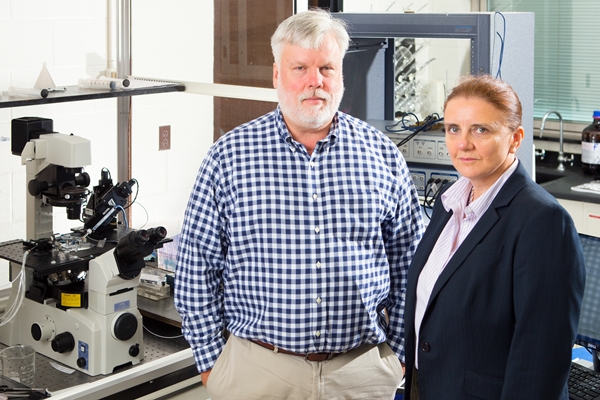
Glenna Bett, right, and Randall Rasmusson, founders of Cytocybernetics Inc. (Douglas Levere, University at Buffalo)
17 January 2018. An award from National Institutes of Health is advancing a technology for testing the safety of drugs with heart muscle cells derived from stem cells before the drugs are tested on humans. The company developing the device, Cytocybernetics Inc. in North Tonawanda, New York, is a spin-off enterprise founded by two faculty members from University at Buffalo medical school.
Cytocybernetics is creating a system for screening drug candidates for their potential harm to the heart from adverse side effects, problems usually revealed in clinical trials. “The number of drugs that can interfere with the function of the heart is astounding,” says company CEO Glenna Bett in a university statement. “Our system tests all kinds of pharmaceuticals, from allergy medications to antidepressants, for unwanted side effects such as heart attacks or arrhythmia.”
Bett is a professor of obstetrics and gynecology at Buffalo, who founded Cytocybernetics with Randall Rasmusson, professor of physiology and biophysics, and the company’s president. The company’s system, called the Cybercyte, tests the effects of drugs on human cardiac myocytes, heart muscle cells derived from induced pluripotent stem cells, also known as adult stem cells taken from existing human tissue instead of embryos. FDA requires this kind of preclinical testing.
While other devices offer techniques for testing drugs before clinical trials, says Cytocybernetics, these techniques often fail to account for a key electrical current in heart muscles known as the cardiac inwardly rectifying potassium current, or IK1 that plays a role in regulating heart rhythms. The company says the Cybercyte sends a synthetic IK1 current through the whole heart muscle cells produced in the lab, giving a more complete assessment of a new drug’s effects on the heart than most other preclinical testing devices.
Betts notes that, “Drug discovery is an expensive process. By getting drugs that aren’t viable out of the pipeline quickly, you can save millions of dollars. As they say, if you’re going to fail, fail fast.”
The new $1.5 million Small Business Technology Transfer grant from National Heart, Lung, and Blood Institute at NIH, funds a 2-year project to further develop the Cybercyte leading to a more automated device, including field tests and validation, ready for the marketplace. The company says the new system will be more compatible with robotic systems that conduct high-volume drug screenings. The new project is an extension of an earlier NIH award to Cytocybernetics to ascertain the system’s technical and commercial feasibility.
In 2015, the same year of the first NIH grant, Cytocybernetics was named a winner of the annual 43North entrepreneur pitch competition for companies in the Buffalo region. In the following video, Betts tells more about the system and company.
- Stem Cell Patches Shown to Treat Heart Attack Damage
- FDA Clears Smart Watch EKG Device
- NIH Funds Heart Tissue Regeneration Tests in Pigs
- Phone App Found to Measure Heart Health Metrics
- Trial Shows Smartphone App Finds More Heart Disease
* * *

 RSS - Posts
RSS - Posts
You must be logged in to post a comment.